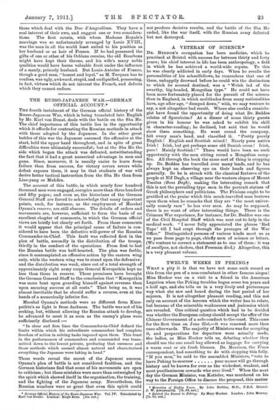A VETERAN OF SCIENCE.*
Da. BEDpos's occupation has been medicine, which he practised at Bristol with success for between thirty and forty years; his chief interest in life has been anthropology, a field in which he has achieved a world-wide repute. To this he was clearly addioted in early days. When be recalls the personalities of his schoolfellows, he remembers that one of them, unhappily drowned before he could win the distinction to which he seemed destined, was a "Welsh lad of the swarthy, big-headed, Mongolian type." He could not have been more fortunately placed for the pursuit of the science than in England, in which multitudes from many nationalities have, age after age, "dumped down," with, we may venture to say, a not altogether bad result. Where else could a craniolo- gist have found the opportunity of doing what Dr. Beddoe relates of Spurzheim P At a dinner of some thirty guests given in his honour he was asked to exhibit his skill in character-reading ; he declined, but said that he would show them something. He went round the company, felt every man's head, and classified it. "Pretty purely English ! English and Scottish mixed ! Nearly pure native Irish ! Irish, but got perhaps some old Danish cross ! Irish, pure ! Mainly Scottish ! " There would have been no such opportunity with the men sitting round a Mongolian camp- fire. All through the book the same sort of thing is cropping up. Dr. Beddoe has travelled Over many lands, and he has always kept an observing eye on their beads and figures generally. So he is struck with the classical features of the people at Nif Daglf, a village near the western slopes of Mount Tmolns (Bouz Dagh), making the interesting remark that this is not the prevailing type seen in the portrait statues of Greek philosophers and politicians: The Frisians ought to be gratified at the praise which this much-travelled man bestows upon them when he remarks that they are "the most univer- sally comely race" he has ever seen. As may be supposed, there is no want of other interesting things. There is the Crimean War experience, for instance, for Dr. Beddoe was one of the Civil Hospital Staff which was sent out to help in the medical work. "I never fully appreciated the phrase `Red Tape' till I had crept through the passages of the War Office." Distinguished persons of various kinds meet us aS we pass from page to Page, chiefly men of science or letterk. (We venture to correct a Statement as to one of them: it was Of smallpox, not cholera, that Freeman died.) Altogether, thie is a very pleasant volume.


















































 Previous page
Previous page